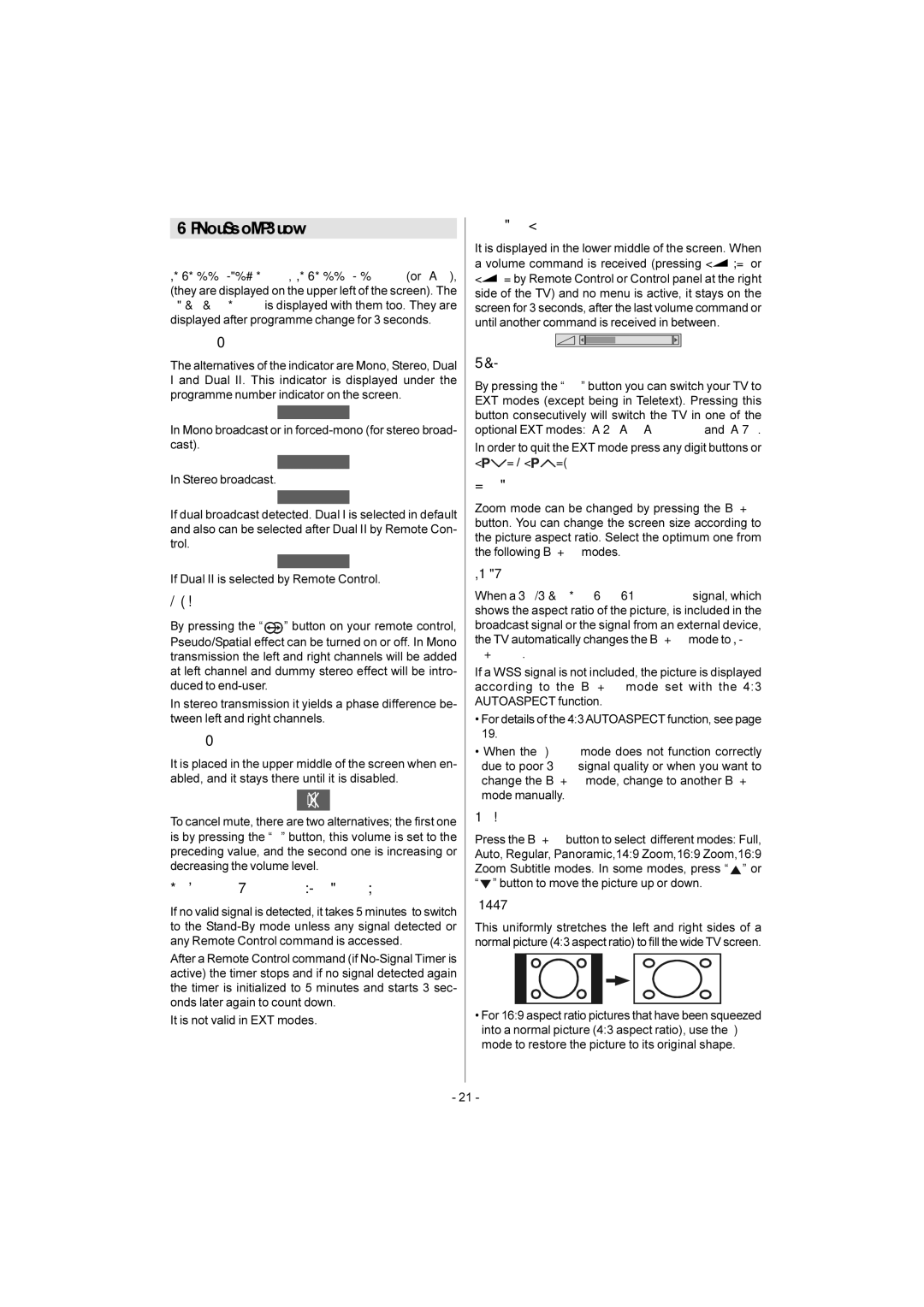
Other Features
TV Status
Programme Number, Programme Name (or EXT), (they are displayed on the upper left of the screen). The sound indicator is displayed with them too. They are displayed after programme change for 3 seconds.
Sound Indicator
The alternatives of the indicator are Mono, Stereo, Dual I and Dual II. This indicator is displayed under the programme number indicator on the screen.
In Mono broadcast or in
In Stereo broadcast.
If dual broadcast detected. Dual I is selected in default and also can be selected after Dual II by Remote Con- trol.
If Dual II is selected by Remote Control.
Hyper Sound
By pressing the “![]()
![]() ” button on your remote control, Pseudo/Spatial effect can be turned on or off. In Mono transmission the left and right channels will be added at left channel and dummy stereo effect will be intro- duced to
” button on your remote control, Pseudo/Spatial effect can be turned on or off. In Mono transmission the left and right channels will be added at left channel and dummy stereo effect will be intro- duced to
In stereo transmission it yields a phase difference be- tween left and right channels.
Mute Indicator
It is placed in the upper middle of the screen when en- abled, and it stays there until it is disabled.
To cancel mute, there are two alternatives; the first one is by pressing the “![]() ” button, this volume is set to the preceding value, and the second one is increasing or decreasing the volume level.
” button, this volume is set to the preceding value, and the second one is increasing or decreasing the volume level.
No-Signal Detection (TV mode)
If no valid signal is detected, it takes 5 minutes to switch to the
After a Remote Control command (if
It is not valid in EXT modes.
Volume Bar
It is displayed in the lower middle of the screen. When a volume command is received (pressing “![]() +” or “
+” or “![]()
EXT Modes
By pressing the “AV” button you can switch your TV to EXT modes (except being in Teletext). Pressing this button consecutively will switch the TV in one of the optional EXT modes: EXT1, EXT2, EXT2 S and EXT3.
In order to quit the EXT mode press any digit buttons or “![]()
![]()
![]()
![]() ” / “
” / “![]()
![]()
![]() ”.
”.
Zoom Modes
Zoom mode can be changed by pressing the ZOOM button. You can change the screen size according to the picture aspect ratio. Select the optimum one from the following ZOOM modes.
AUTO:
When a WSS (Wide Screen Signalling) signal, which shows the aspect ratio of the picture, is included in the broadcast signal or the signal from an external device, the TV automatically changes the ZOOM mode to PAN-
ORAMIC.
If a WSS signal is not included, the picture is displayed according to the ZOOM mode set with the 4:3 AUTOASPECT function.
•For details of the 4:3 AUTOASPECT function, see page 19.
•When the AUTO mode does not function correctly due to poor WSS signal quality or when you want to change the ZOOM mode, change to another ZOOM mode manually.
Using the different screen formats
Press the ZOOM button to select different modes: Full, Auto, Regular, Panoramic,14:9 Zoom,16:9 Zoom,16:9 Zoom Subtitle modes. In some modes, press “ ![]() ” or
” or
“![]() ” button to move the picture up or down.
” button to move the picture up or down.
FULL:
This uniformly stretches the left and right sides of a normal picture (4:3 aspect ratio) to fill the wide TV screen.
•For 16:9 aspect ratio pictures that have been squeezed into a normal picture (4:3 aspect ratio), use the FULL mode to restore the picture to its original shape.
- 21 -
